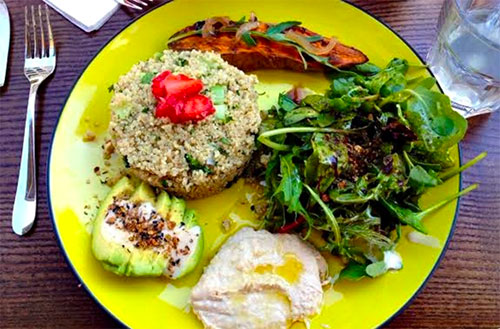Below you will find a selection of the most recent entries from bloggers in our Family/Health section. To view the entries from individual bloggers, click on the links below:
- Mirsada Hoffmann Thriving Global Family: Supports parents raising children across cultures—helping families build emotional resilience, strengthen connection, and find steadiness in the face of change.
- Lee Eldrige The Athlete Tribe
- Dr. Michelle Wright Dr Michelle Wright is a British-trained General Practitioner and Director of HealthFirst, providing physical First Aid training and Mental Health First Aid training, as well as Health Education, throughout Switzerland (www.healthfirst.ch). She also has a regular radio show about health on World Radio Switzerland. Believing that prevention is better than cure and that we should be treating the root cause of illness, Dr Michelle is also a Lifestyle Medicine enthusiast.
- Birgit Suess is a Swiss-American who grew up between the US and Switzerland and speaks English, German and Swiss-German. Because of a worldwide shortage of Speech Therapists, she uses technology to connect special needs students around the world with English speaking Speech Therapists. With almost 20 years of experience as a Speech Therapist and 10 years experience with Teletherapy, she is a pioneer in the Teletherapy world. Her personal specialty is working on social language with high functioning children on the Autism Spectrum. Her passion is finding new and innovative ways to help children with special needs.
- Dr. Irina Schurov is a Nutritional Neuroscientist with a PhD from Cambridge University (UK) and over 20 years’ experience in science and health-providing services. She created and founded LiveRight, an initiative to help others through nutrition and wellbeing strategies. By building an educational platform around healthy eating habits, by restoring the relationships between people and food, by supporting your individual circumstances and through personalized coaching in nutrition, she wants to help you and your family achieve the optimal balance between help and life.
- Dr. Penny Fraser is a British-trained Emergency Medicine doctor, who lives in Geneva. She is also the mother of two busy little skiers aged 7 and 8. Along with Dr Michelle Wright and her other colleagues at HealthFirst, she has a passion for delivering health education and First Aid training to the English-speaking community in Switzerland

For this blog, I have invited HealthFirst’s Midwife and mother of four, Polly Pupulin, to give us her 5 top tips for expectant mothers....
By Polly Pupulin, Midwife, www.healthfirst.ch
I love midwifery and have done since I first started in 2001. Part of my work is the privilege to introduce parents to the amazing ‘dance’ that happens between the baby and mother during pregnancy and labour during a Birth Preparation Course.
If I could personally give five tips to every expectant parent here in Switzerland, this is what I would say:
1. You have a choice where and how you birth your baby. The birth is not just a medical procedure but involves many other factors such as your personal preferences, your cultural expectations, your previous experiences of childbirth and what both you and your partner believe birth is all about.
2. The best form of ‘natural’ pain relief is a supportive birth partner and a compassionate midwife in whom you have confidence. You may have heard of epidurals – and they definitely have their place – but there are many compatible and harmonising pain relief options to learn about.
3. The labour process is a blend of you and your baby working together. Both of you have a role and will be communicating together. Knowing this may calm you and help you feel part of a loving team.
4. Yes, your life will change when your baby is born. However everyone reacts and adjusts differently and you won’t know until the challenge is there. So welcome to the journey – and enjoy it!
5. You may be away from your normal family support network in your home country but you are not alone. Create or join a new group of like-minded parents and parents-to-be here in your country of residence – in person and online. Having this support within your own community is proven to reduce your risk of post-natal depression.

By Hiba Giacoletto, Wiser Humans
Connection is why we're here; it is what gives purpose and meaning to our lives. - Brené Brown
A few months ago, my 11 year marriage broke-up.
Like all humans, I need connection. I crave connection. I can’t live without connection.
Learning to be just me after 15 years of being a couple, I needed to redefine connection.
I had heard Barbara Fredrickson speak about her research on Love 2.0 at a conference and I really related to her way of reframing love.
Her idea is that love is about so much more than romantic connections.

by Milena McRae, www.milenamcrae.com
According to Mayo Clinic research, embracing forgiveness and relieving yourself of past pains plays a vital role in our Physical, Emotional and Spiritual health.
On the Physical level, letting go of the past boosts your immune system, lowers your blood pressure improving heart health, relieves acute and chronic pain, improves digestion and balances your hormones. Emotionally, forgiveness reduces stress, anxiety and hostility, enhances self-esteem, increases compassion and opens us to better relationships. On the Spiritual level, we feel re-connected with our closer and wider environment, our world expands and we are open to hear the innate guidance on how to proceed every day in alignment with our greater purpose.
Yet for many, forgiving and letting go doesn't come spontaneously. I would like to share with you the practice I have developed and find really easy to follow.

by Milena McRae, www.milenamcrae.com
As we go through life, we distinguish as clearly as black and white between the good and the bad - we learn to do this from a very young age as we are trained by our well-meaning environment to become an individual who fits in with the expectations of the system and those around us. So our beliefs about what is good and what is bad are deeply ingrained in us and form the basis of our habits, behaviours and choices we make later in life.
Once established, we use this framework to navigate through life and make conscious choices. Habitually then, when we don't like our circumstances, we are prompted into action, focusing on the negative results in order to rectify them. This causes us to focus our energy and time on the negative side of things before the desired circumstances seem even possible.

By Hiba Giacoletto, Healthwise
Growing up in an Arabic family meant that hummus was a staple in our home. Whenever we had to bring something for school events, my mother would make hummus.
Something wasn’t going well? Eat hummus. Something to celebrate? Lets make hummus.
So yes, I do like my hummus. And for a long time, I stuck to my mother’s traditional hummus recipe. Then one of my Food Coaching clients casually mentioned she had thrown in a few sun-dried tomatoes to my hummus recipe. Sun-dried tomatoes and hummus? I was intrigued but did I dare mess with such an institution?
Next time I made hummus, I tentatively added a few sun-dried tomatoes. It blew me away. Excited by the idea of re-creating hummus, I started experimenting. I added in zucchini in summer. Pumpkin in autumn. Some raw beetroot in winter.
And I discovered that there is no one way of preparing hummus - that there were endless varieties of this delicious dish.
I put together these recipes and guidelines to help you get started. Once you understand the building blocks, you will know what you want to add more or less of - keep tasting as you prepare food and trust your intuition!
Click here to download my Everything Hummus Guide and Video.








